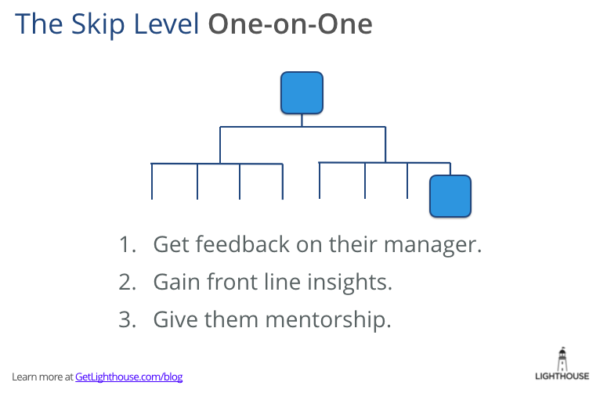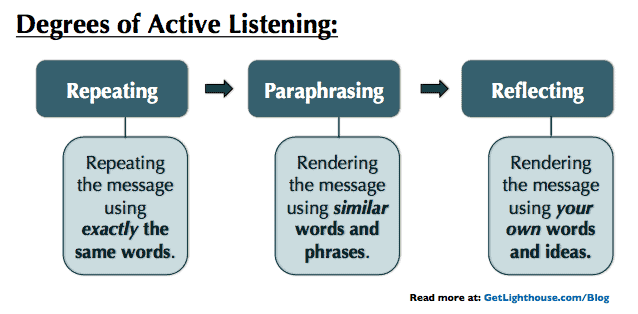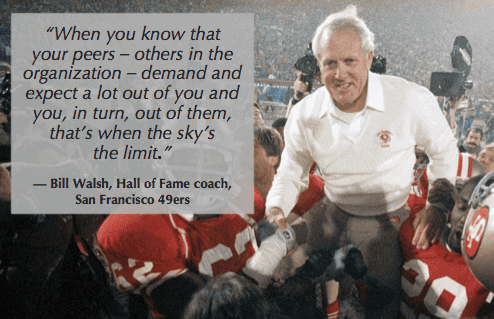Do you know how your managers are doing?
Would you be surprised if any of them suddenly had a few team members quit?
Or maybe your spidey-sense is going off that something isn't quite right with one of your teams, but you're not sure why?
The life of a senior leader is filled with challenges. And one of the most important things you can do to manage those challenges is to keep a pulse on your growing organization.
People leave managers, not companies, so it's important that you coach your managers, so they take good care of their teams.
Today, we give you one of the best tools available to help you do just that and be a better coach to your managers in the process.
Table of Contents
- How to start skip level meetings
- How to navigate skip level 1 on 1s with your teams
- How to give your manager the feedback
- Further reading

How to Improve Your Managers as a Senior Leader Using Skip Level 1 on 1s
As a senior leader, you may think you know how things are going because you run an engagement survey once or twice a year, or because you ask your managers how their teams are doing.
But that's not enough – you should also ask their team members directly.
How do you do that? By starting skip level meetings.
Skip level meetings (also called skip level 1 on 1s) are your best tool for getting a pulse on how people deeper in your organization are doing.
Skip level 1 on 1s are like regular 1 on 1s, except you meet with people deeper in your org:

You can use skip level meetings for a variety of purposes including to:
- Find out how your managers are really doing beyond what they tell you.
- Get feedback and insights to help your managers, and their teams, improve.
- Get a pulse on what's happening on the front lines you're layers removed from.
- Build trust with those lower in your organization so they stay engaged and contributing.
- Learn where there is dysfunction, insufficient communication, or confusion within parts of your organization.
- Personally demonstrate that you value everyone in your organization in a scalable way.
Today, we focus on that first one: finding out how your managers are doing, because it's so important to the success of your group or department.
First, let's talk about how to start skip level meetings.

Part 1: How to start skip level 1 on 1s
If you've never read our guide to skip level meetings for senior leaders before, it covers everything you need to know to get started with skip level 1 on 1s.
As a quick reminder, the steps are:
- Tell your managers: to avoid surprises or concerns about what will be a net positive for them.
- Tell your skip level team members: so they know why you are meeting with them and what to expect (and aren't too intimidated meeting with their manager's boss).
- Schedule them in a manageable way: there are still only 24 hours in a day, so you will have these much less often than regular 1 on 1s. Typically, senior leaders will will try to meet every 3-12 months with each person, depending on your number of skip level team members.
*To get step-by-step advice on starting skip level meetings, read guide to skip level meetings.
Also: Be strategic in how you schedule.
When you schedule your skip level meetings, the key is to be thoughtful about when you schedule them and with whom.
Chances are, you have multiple managers that report to you. That means multiple teams of people to meet with.
If you want to see how a manager is doing, you'll want to check in with all, or a reasonable part of their team, within a small time frame (i.e. a few weeks to a month). This then gives you a great snapshot and a variety of perspectives about that manager.

Part 2: How to navigate skip level 1 on 1s with your teams
Once you have the meetings scheduled, what do you do?
It's important to have a good plan, as you want to make the most of this kind of major time investment.
Here's how to have effective skip level 1 on 1s:
1) Ask Quality Questions
Good questions are the bread and butter of effective 1 on 1s.
With the right question, you can accomplish all kinds of things like:
- Build rapport and create a positive connection
- Uncover issues or challenges within the team
- Obtain feedback to help your manager lead better
- And more
When you start, focus on rapport especially. You've likely only met these team members on a few occasions (and never in a private, 1-on-1 capacity), so a little rapport can break the ice, and let them know this is a friendly meeting (not that they're in trouble).
Building rapport also helps them feel more comfortable then in sharing feedback and their perspective with you.
Start by building rapport with questions like:
- What drives you? What motivates you to come to work each day?
- Where did you grow up? Where did you go to college?
- What's your favorite part about living in [your city/town/region]?
- What's your favorite book you've read / podcast you've listened to / movie you saw recently?
- What made you decide to become a(n) [engineer/marketer/salesperson/customer success/role]?
Once you've broken the ice, it's time to ask questions that will help you obtain the feedback you're looking for.
First, you can get feedback about their manager with questions like:
- Do you feel you're getting enough feedback from your manager? Why/Why not?
- When was the last time you had a conversation with your manager about your career? How did it go?
- How does your manager handle questions when you ask for help?
- What is a recent situation you wish your manager handled differently?
It's also worth asking questions about the team as a whole:
- How is your / your team's workload? Do you feel it's too little, too much, or the right amount?
- Do you feel like underperformers are properly handled here? Why or why not?
- What are your biggest concerns about [recent change X]?
- Who are the most valuable people on your team? What makes them essential?
Once you've started asking good probing questions, though, your real job begins.

2) Be sure to ask for specifics
Now that you've started diving into key issues, you need to turn your listening skills up and get the full picture.
Ask for specific examples from each skip level team member to understand what happened, and how it affected them (and others if it's a group issue).
That's where great follow-up questions come in, and also good listening skills.
It's our natural inclination to be thinking about what we want to say next while the other person is speaking. It's a bad habit you need to break.
This is particular problematic when you're just getting to know someone, as you're unlikely to fully understand someone half hearing them once.
To fix this, start practicing active listening skills:

The key is to really focus on them and what they're saying.
Before you move to another topic, or the next thing you want to say, take a moment to reflect on what they've said. Then, paraphrase that message back to them in your own words.
They'll either agree with you, and you can move on, or clarify, which ensures you understand what they meant.
Given much of these conversations are about how your managers are doing, and ideas for improving your company, you want to be sure you truly understand them. Misunderstanding them is either a missed opportunity, or a potential mistaken bit of feedback leading to an awkward conversation with your managers.
3) Reflect & triangulate
Unless it's an issue solely between the skip level team member and their manager, don't rely on that one team member's story alone.
Instead, look to learn more about the situation from multiple team members. Ask the same or similar questions to see if they feel the same way, are having the same issue, or give the same feedback based on your skip level questions you ask.
For each person, practice your active listening skills, and keep asking follow up questions until you feel you truly understand their perspective. This ensures you get a full picture of what's happening on this manager's team.
Then, take the time to reflect on what everyone said and think about the common patterns you heard.
Ask yourself questions like:
- What did they all agree on?
- Where was there differing views?
- What sounded most important based on their energy, team emotions, and your instincts?
Armed with this reflection, you're ready to talk to their manager about it, so you can help them improve.

Part 3: How to give your manager the feedback
Now that you've gathered your skip level feedback, it's time to talk with the team's manager in your next 1 on 1 with them.
However, before you sit down with them, it's important to consider your game plan for bringing the feedback to them in a way that's productive for both you and them.
Here's how to do that:
- For more detailed advice on how to give constructive feedback, read our guide on How to Give Constructive Feedback to Motivate and Improve Your Team.
1) Listen to their side
Before you jump to giving them the feedback, make sure you pause and hear their side. This helps you avoid any awkward mistakes, and hear an unbiased view from their side.
If you wait, and were to give your feedback first, you could either end up hearing a defensive answer from the manager, or miss out on learning something that would change your feedback.
I've lost count of the number of times I had feedback ready to give someone, only to hear some new information from them at the start of the 1 on 1 that dramatically changes may feedback or makes it unnecessary.
Ask them some questions first.
The best way to ensure you hear their side is to go back to what we did earlier with their team: ask questions.
Most importantly, ask them how their team is doing:
- Who are your top performers? Why did you choose them?
- Who on your team is struggling right now? What tactics are you using to help them?
- How do you solicit ideas and feedback from your team? How often?
- What's one thing we should stop doing?
- What's a recent situation where you'd like my advice on how to handle it now or next time?
You can also ask them what they need to help their team run more efficiently:
- What's the biggest thing preventing your team from getting more done, or done better?
- How much time are you spending on individual work? What about managing? (Are they investing enough in their team?)
- Am I available to support you when you need it? What is a recent example that comes to mind? (Explore this and do more of what they liked, or find out what you can do differently)
Also, ask them how they're doing:
- How is managing your team going for you?
- How is your / your team's workload? Too little, too much, or the right amount?
- What is your least favorite part about being a manager? How do you handle that?
- Are you happy in this role? What could make it better for you?
By asking a few questions like these (and follow up questions on anything that seems worth exploring deeper), you can get an idea of how they're feeling about their team and about themselves as a manager.
Once you've done that, it's time to bring up the feedback you received from the team.
*For more great questions to ask your managers during their 1 on 1s, read: questions to ask a manager during 1 on 1.

2) Tell them you heard some feedback from their team
Now that you've gotten their side, start by sharing the high-level themes of what you heard the multiple team members you spoke with.
Provide what details you can so they'll understand the situation. Let them know why it's important, too.
Coach them on how they can improve. One way you can do this is by sharing how you may have handled the situation differently, and why it's important.
Make sure they clearly understand the gravity of the issue, whether big or small. There's a big difference between "I found out some of your team is interviewing or thinking about quitting” and "I think this could go better. It's annoying, but most of your team is still happy”.
The last thing you want is to hesitate to go too hard on them (or not explain clearly enough) and have them think things aren't as bad as they really are, as that will influence their response to the issue.
Further reading:
- Throughout this process, emotional intelligence is key. It not only helps you gauge what's behind their answers as you're asking them questions but how they're responding to your feedback. So, check out our guide on improving your emotional intelligence: how to improve emotional intelligence in leadership.

3) Keep it anonymous
Lastly, and very importantly, bring up the issue without mentioning anyone by name.
Keep it anonymous unless there's no way to avoid doing so. You need to be clear that it's unacceptable to retaliate against their team members for talking to you (or you should fire them… that kind of manager will destroy productivity, morale, and spike turnover).
Also, it's best if you give the feedback in their 1 on 1; it will feel less serious than if you schedule a special time just to talk about the feedback.
Further, it's highly beneficial to use your 1 on 1s for this, because you create a clear time to check in on progress and how they've done applying your coaching and feedback on this.
Finally, remember: all of this is to help the manager improve.
Come at the conversation from a mindset of "I want to help you” not "you're doing it wrong”. Self-awareness is the hardest skill for managers to learn and this kind of discussion will help them connect the dots and develop it.

Use skip level meetings to help your managers improve
As a senior leader, it can be difficult to know how your teams are doing as your org chart continually grows larger and larger.
Whether you get the sense that something is off with one of your teams, or you just feel out of touch and you want to get a pulse on how things are going, skip level 1 on 1s give you a great way to find out.
By spending some of your skip level 1 on 1 time finding out how your managers are doing, you unlock a great way to coach and develop them, and make work better for everyone in your group or department.
For further reading to help you take your managers and their teams to new levels of greatness, check out our guides on everything from the ultimate 1 on 1 template to the best books for new managers:
- A senior leader should still do occasional coaching: 12 Questions to Ask Your Team to Become a Better Coach at Work
- Remember to help your managers when their task relevant maturity is low: Task Relevant Maturity: A Management Concept Great Leaders use Daily
- Master your 1 on 1s and help your managers too with this: One on One Meetings: The Only Guide Managers Need [Free Template]
- Developing your managers? Here are professional development goals for you to work with them on: 8 Best Goals for Manager
- Here are our favorite books for new managers: 8 Best Books for New Managers on Leadership and Development





